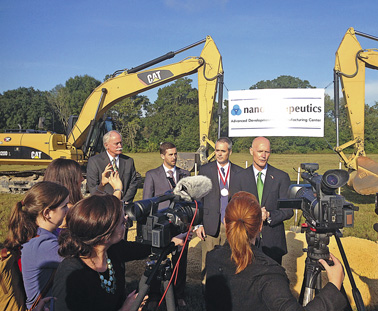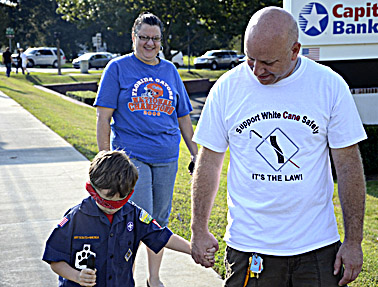 Governor Rick Scott answers questions from the press after the ground-breaking ceremony. The new facility is expected to be operational in early 2015.
Governor Rick Scott answers questions from the press after the ground-breaking ceremony. The new facility is expected to be operational in early 2015.
ALACHUA – Riding in a limousine, the governor pulled up to the site in Alachua that promises to add new jobs to the city.
Governor Rick Scott spoke at the groundbreaking ceremony on Wednesday, Oct. 23, for the biotech company Nanotherapeutics’ new research and manufacturing facility, which the company expects to bring 150 jobs to the city of Alachua.
“That’s a big deal anywhere in the state,” Governor Scott said.
The 165,000 square-foot facility, located at 13200 NW Nano Court, is being constructed with money secured by a contract between Nanotherapeutics and the U.S. Department of Defense (DoD)that was awarded earlier this year.
The contract charges Nanotherapeutics with developing countermeasures to protect against biological terrorism and epidemics, particularly for the military.
Nanotherapetuics got $135 million, and could get up to $358 million over a span of 10 years from the DoD.
In late September, the U.S. Department of Health and Human Services also committed to a contract with Nanotherapeutics to increase the national capacity to develop flu vaccines.
At the ceremony, Governor Scott presented James Dalton, CEO of Nanotherapeutics, with the Governor’s Business Ambassador Award.
The state of Florida’s economy has turned around since Scott took office, he said, with the help of companies such as Nanotherapeutics.
“Florida is experiencing an incredible economic turnaround thanks to our job creators like Nanotherapeutics,” Governor Scott said.
The site of the new facility has historical significance for Alachua, said Mayor Gib Coerper.
It is where the Copeland Sausage plant used to be located. Copeland Sausage employed about 400 workers who lost their jobs when the plant closed down in 1978.
The groundbreaking ceremony is celebrated on the same site that taught Alachua a lesson about the importance of attracting diverse businesses, Coerper said.
Now, Alachua has a wide range of businesses in the bioscience fields, Coerper said, boasting the third highest concentration of bioscience companies in the state.
“We strive to make Alachua business-friendly,” he said. “Today is a great day for your company, and a proud day for the City of Alachua,” he told CEO Dalton.
Nanotherapeutics started in the Sid Martin Biotech Incubator, but quickly grew. It eyed several states as potential hosts for the new facility, including California, Michigan and North Carolina. In the end, it chose to remain in Alachua.
“We are grateful to Nanotherapeutics for wanting to stay,” said Mitch Glaeser, chairman of the Gainesville Area Chamber of Commerce.
The Nanotherapeutics Advanced Development and Manufacturing Center should be operational by March 2015, said CEO James Dalton.
As the speeches finished up, Governor Scott, Mayor Coerper and Dalton thrust their shovels into the ground to complete the ceremony, marking the start of construction on the facility.
The plant will be a huge opportunity for Alachua, said Adam Boukari, assistant city manager, in an earlier interview.
“Nanotherapeutics is going to be a big part of Alachua’s future,” he said.
# # #
Email cmckinney@
alachuatoday.com
Add a comment


 HIGH SPRINGS – In a hurricane or other serious emergency, the High Springs Police Department (HSPD) is now able to reach stranded travelers, ride over flooded streets, remove or run over fallen trees and reach people in difficult to access locations, with the help of a donation from the United States Department of Defense (DOD).
HIGH SPRINGS – In a hurricane or other serious emergency, the High Springs Police Department (HSPD) is now able to reach stranded travelers, ride over flooded streets, remove or run over fallen trees and reach people in difficult to access locations, with the help of a donation from the United States Department of Defense (DOD).  ALACHUA – When the group of people was walking along the sidewalk by U.S. Highway 441 in Alachua, the noise of traffic could be noticed more easily by some than others. Without vision, the other senses they rely on had sharpened.
ALACHUA – When the group of people was walking along the sidewalk by U.S. Highway 441 in Alachua, the noise of traffic could be noticed more easily by some than others. Without vision, the other senses they rely on had sharpened.